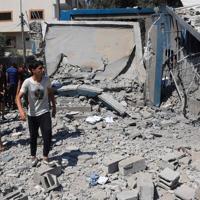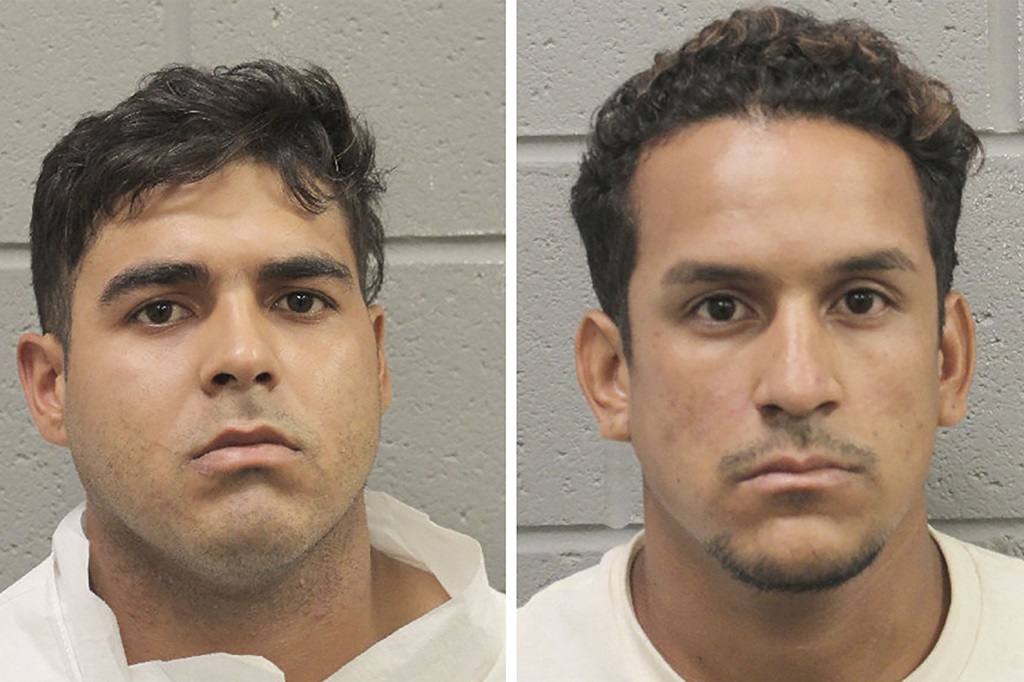Israeli attacks kill dozens more people after US criticises high civilian death toll

GAZA STRIP
Authorities in the Hamas-controlled Gaza Strip said the Israeli offensive on Tuesday killed dozens of Palestinians in three separate attacks, despite renewed criticism from the United States over the high number of civilian casualties.
Class=”cf”>
Mahmoud Bassal, spokesman for the Gaza Strip’s civil defense, said the three airstrikes killed at least 44 people and wounded dozens more in the war-torn Palestinian territory within an hour. Israel confirmed that it carried out two of the strikes.
The Health Ministry said 17 people were killed in an attack on a gas station in Al-Mawasi in the south of the Gaza Strip. The Palestinian Red Crescent said an almost simultaneous attack hit the UN-run Al-Razi school in the Nuseirat refugee camp in the center of the Gaza Strip, killing five people.
The Civil Defense Authority said the third attack targeted a crowd near a roundabout in northern Gaza, but did not give an exact number of casualties.
US Secretary of State Antony Blinken had previously conveyed to two senior Israeli officials Washington’s “grave concerns” about the deadly Israeli attacks in the Gaza Strip, his spokesman said.
“We have seen that civilian casualties have declined since the height of the conflict … but they still remain unacceptably high,” spokesman Matthew Miller said after Blinken met with Secretary of Strategic Affairs Ron Dermer and National Security Adviser Tzachi Hanegbi.
Class=”cf”>
Washington is pushing for a ceasefire between Israel and Hamas.
A senior Hamas official said on Sunday the group was pulling out of indirect talks on a deal in protest against Israeli “massacres,” including a major attack that killed at least 92 people that day, according to the Gaza Health Ministry.
Hamas is ready to resume indirect talks as soon as Israel “shows seriousness about reaching a ceasefire agreement and a prisoner exchange,” he said.
On Tuesday, Israeli Prime Minister Benjamin Netanyahu announced that he would increase pressure on Hamas.
“This is precisely the right time to increase the pressure even further, to bring all hostages – living and dead – home and to achieve all war aims,” he said.
Allegations of mistreatment of prisoners
The Israeli military said planes had attacked about “40 terror targets” in Gaza, including “sniper posts, observation posts, Hamas military structures, terror infrastructure and buildings rigged with explosives.”
It said the troops would continue their targeted attacks in the southern city of Rafah and central Gaza.
Class=”cf”>
The United Nations Humanitarian Office (OCHA) said dozens of people were killed or injured in several attacks in the Gaza Strip on Tuesday.
The war began with Hamas’ unprecedented attack on Israel on October 7, in which, according to Israeli sources, 1,195 people, mostly civilians, were killed.
In addition, Hamas captured 251 hostages, 116 of whom are still in the Gaza Strip. According to the Israeli military, 42 of them are dead.
Israel responded with a military offensive in which, according to the Gaza Health Ministry, at least 38,713 people were killed, mostly civilians.
Class=”cf”>
The Israeli military has also arrested numerous Gaza residents who have made allegations of torture, rape and other ill-treatment in custody, which the Israeli authorities deny.
Palestinian lawyer Khaled Mahajna said on Monday that prisoners had reported that guards had used “stun guns” on prisoners.
In the case of one prisoner, a “fire extinguisher tube was inserted into his buttocks and the fire extinguisher was turned on,” Mahajna said after visiting imprisoned Palestinian journalists.
Class=”cf”>
Mass relocation
Qatar and Egypt, with US support, have brokered indirect talks to end the devastating war, but months of negotiations have failed to produce a breakthrough.
At the end of May, US President Joe Biden outlined a ceasefire plan he had worked out with Israel, which triggered an intensification of talks.
But despite meetings in Cairo and Doha, there is no sign of progress towards this goal.
Critics in Israel, including tens of thousands of protesters demanding a deal to release the hostages, accused Netanyahu of prolonging the war.
The conflict has forced 90 percent of Gaza’s 2.4 million residents to flee. Many have sought refuge in UN schools, seven of which have been hit by Israeli attacks since July 6.
“Why are they attacking us when we are innocent people?” asks Umm Mohammed al-Hasanat, who is seeking refuge with her family in a UN-run school in Nuseirat that was also hit.
“We don’t carry weapons, we just sit there and try to find safety for ourselves and our children.”
The war also saw almost daily exchanges of fire between Israeli forces and the Iranian-backed Lebanese Hezbollah movement, which claims to support Hamas.
Official Lebanese media reported that five people, including three Syrian children, were killed in Israeli attacks on southern Lebanon on Tuesday. Hezbollah announced it would fire rockets at Israel in retaliation.
Meanwhile, ultra-Orthodox Jewish police protesters clashed near Tel Aviv, just hours after the Israeli military announced it would begin issuing draft notices to men from the community starting Sunday.
Ultra-Orthodox seminaries have always been exempt from military service. But now they are being drafted because the Gaza war and a possible conflict with Hezbollah are draining the population’s resources and fueling resentment against those who do not have to serve.



